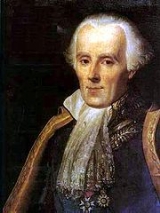
Pierre-Simon Laplace
Overview
Mathematician
A mathematician is a person whose primary area of study is the field of mathematics. Mathematicians are concerned with quantity, structure, space, and change....
and astronomer
Astronomer
An astronomer is a scientist who studies celestial bodies such as planets, stars and galaxies.Historically, astronomy was more concerned with the classification and description of phenomena in the sky, while astrophysics attempted to explain these phenomena and the differences between them using...
whose work was pivotal to the development of mathematical astronomy
Astronomy
Astronomy is a natural science that deals with the study of celestial objects and phenomena that originate outside the atmosphere of Earth...
and statistics
Statistics
Statistics is the study of the collection, organization, analysis, and interpretation of data. It deals with all aspects of this, including the planning of data collection in terms of the design of surveys and experiments....
. He summarized and extended the work of his predecessors in his five volume Mécanique Céleste (Celestial Mechanics
Celestial mechanics
Celestial mechanics is the branch of astronomy that deals with the motions of celestial objects. The field applies principles of physics, historically classical mechanics, to astronomical objects such as stars and planets to produce ephemeris data. Orbital mechanics is a subfield which focuses on...
) (1799–1825). This work translated the geometric study of classical mechanics
Classical mechanics
In physics, classical mechanics is one of the two major sub-fields of mechanics, which is concerned with the set of physical laws describing the motion of bodies under the action of a system of forces...
to one based on calculus
Calculus
Calculus is a branch of mathematics focused on limits, functions, derivatives, integrals, and infinite series. This subject constitutes a major part of modern mathematics education. It has two major branches, differential calculus and integral calculus, which are related by the fundamental theorem...
, opening up a broader range of problems. In statistics, the so-called Bayesian interpretation
Bayesian probability
Bayesian probability is one of the different interpretations of the concept of probability and belongs to the category of evidential probabilities. The Bayesian interpretation of probability can be seen as an extension of logic that enables reasoning with propositions, whose truth or falsity is...
of probability was mainly developed by Laplace.
He formulated Laplace's equation
Laplace's equation
In mathematics, Laplace's equation is a second-order partial differential equation named after Pierre-Simon Laplace who first studied its properties. This is often written as:where ∆ = ∇² is the Laplace operator and \varphi is a scalar function...
, and pioneered the Laplace transform which appears in many branches of mathematical physics
Mathematical physics
Mathematical physics refers to development of mathematical methods for application to problems in physics. The Journal of Mathematical Physics defines this area as: "the application of mathematics to problems in physics and the development of mathematical methods suitable for such applications and...
, a field that he took a leading role in forming.
Quotations
The exchange is reported by Victor Hugo (who in turn was citing Arago) as:![]()
"[Sire,] je n'avais pas besoin de cette hypothèse-là."![]()
Translation: "I did not need to make such an assumption."
"Les questions les plus importantes de la vie ne sont en effet, pour la plupart, que des problèmes de probabilité."![]()
Translation: "Life's most important questions are, for the most part, nothing but probability problems."
----
"La dernière chose que nous attendions de vous, Général, est une leçon de géométrie !"![]()
Translation: "The last thing we expect of you, General, is a lesson in geometry!"
"?"![]()
Translation: "What we know is not much. What we do not know is immense."

